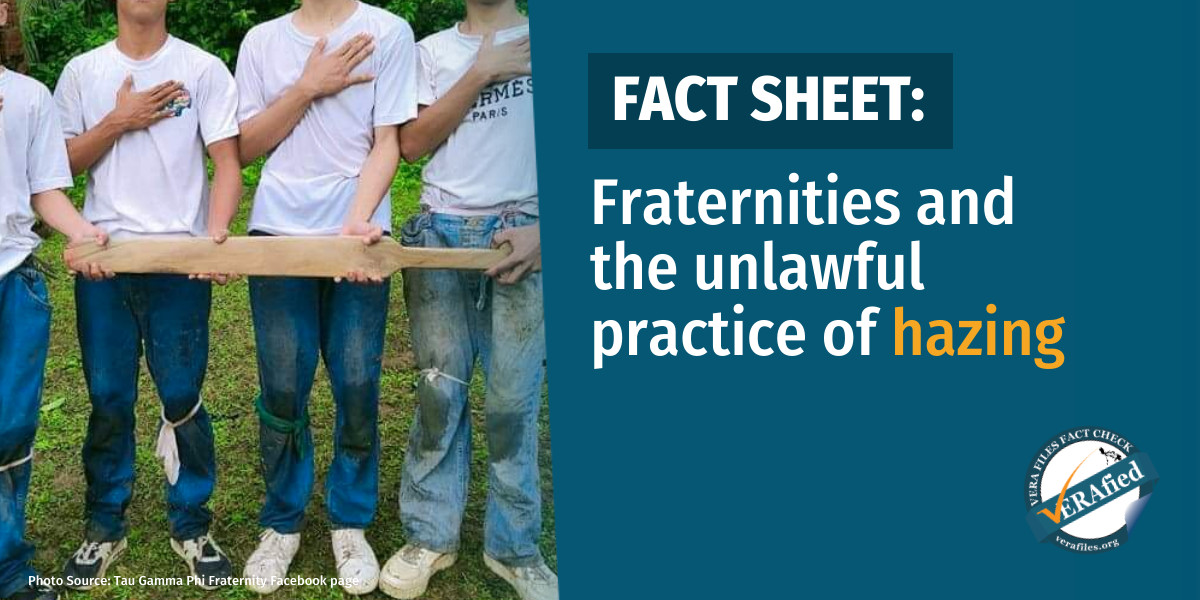Recent news about the death of two college students from severe injuries during initiation rites have raised questions on why fraternities continue the practice of hazing and how the law criminalizing it can have more teeth.
The families of John Matthew Salilig, a 24-year-old chemistry student at Adamson University, and Ronnel Baguio, a 20-year-old marine engineering student at the University of Cebu, are clamoring for justice for the killing of these former neophytes of Tau Gamma Phi fraternity.
The remains of Salilig, who went missing for 10 days, were found in a vacant lot in Imus, Cavite on Feb. 28. Two days later, the Public Attorney’s Office revealed that Baguio had succumbed to alleged hazing injuries inflicted by members of the fraternity’s chapter at the University of Cebu in December last year.
At least four suspects in Baguio’s death who surrendered on March 8 face charges of murder and violation of the anti-hazing law.
Meanwhile, seven members of the Adamson chapter of Tau Gamma Phi have been charged in the Salilig case. Criminal complaints for at least 13 more suspects are under review by the Justice department.
Hazing is prohibited in initiation rites of fraternities, sororities and other organizations under Republic Act (RA) No. 8049, or the anti-hazing law, which came into force in 1995. However, more hazing deaths were recorded despite the passage of the law, which was amended in 2018 to impose fines and a longer jail term under RA No. 11053.
Section 2 of RA 8049, as amended by RA 11053, defines hazing as “any act that results in physical or psychological suffering, harm, or injury inflicted,” such as paddling, whipping and exposure to the weather, as a prerequisite for admission or a requirement for continued membership in a fraternity, sorority or organization.
Hazing includes any activity, whether intentionally done or not, that tends to humiliate or embarrass, degrade, abuse, or endanger by requiring mental, silly or foolish tasks.
To help explain why fraternities continue to include hazing, often violent, in recruiting members, VERA Files Fact Check interviewed Filomin C. Gutierrez, a sociology professor from the University of the Philippines (UP).
1. Why do fraternities still conduct hazing despite its criminalization under RA 8049?
Fraternities based in schools or communities commonly have all-male members, practice hazing to affirm a culture of masculinity and honor a tradition held by senior members, according to Gutierrez. She noted that fraternities prefer to use the term “initiation rites” rather than hazing.
“My theory is that as young men find affirmation of their identity as men, the fraternity offers this route, albeit a circumvented route (short-cut) to masculinity,” the professor, who has conducted two studies about fraternities in UP Diliman, said in an email interview.
She added, “This hyper masculine culture in fraternities risk[s] adopting practices such as harsh, physical, mental and emotional testing that can lead to deaths, incarceration, and injuries.”
2. What do fraternity leaders and members get from hazing?
Gutierrez, former president of the Philippine Sociological Society, said fraternity leaders and members find satisfaction from “inculcat[ing]” in neophytes their own experience with initiation rites. Passing on an “honored tradition” from their revered or famous senior members is also a factor.
“Initiation rites are infused with profound meanings about becoming a member of the fraternity, the fraternity’s values, beliefs, ideals, and commitments,” she said. “As a rite of passage or ritual, it serves to test the commitment of the neophyte, someone who is new, an outsider who is entering into the organization.”
Others join the brotherhood because of peer pressure, the need for friends and a supportive social circle, and expansion of their social network for economic, social and political gains.
The usual ritual includes physical and mental tests. Salilig, for example, reportedly died from severe blunt force trauma to the lower extremities due to repeated paddling.
In the United States, Gutierrez said, initiation rites in “white” colleges involve delinquent practices like binge drinking, sexual conquests and extreme partying. Brotherhoods of minority groups, such as African-American and Asian-American, are more likely to conduct violent physical hazing.
3. How can hazing be effectively stopped? Should fraternities be banned?
Gutierrez offers six suggestions to help stop hazing by university-based fraternities. These include teaching alternative ways to achieve manhood without violence and periodically reminding fraternity members about the dangers of hazing.
On proposals to ban fraternities altogether, Gutierrez said, “It’s for us to think about.” She expressed concern, however, that a ban could simply force these groups to go underground.
“If we recognize and not ban them, we should hold them accountable for their behavior and demand transparency about their practices, something that is challenging to achieve given their exclusivity,” she said.
For example, the Adamson chapter of Tau Gamma Phi did not secure a permit from the university administration for Salilig’s initiation as the fraternity is not an accredited student organization.
Jan Nelin Navallasca, the university’s director for students affairs, maintained that Adamson has not been “remiss” in its obligations to inform transferees and freshmen about its policy against fraternities.
Section 4 of the amended RA 8049 states that registered school-based fraternities must submit a written application at least seven days before holding initiation rites where at least two school representatives must be present. Since Adamson has a total ban on fraternities, Tau Gamma Phi went underground where its activities were unmonitored by school authorities.

